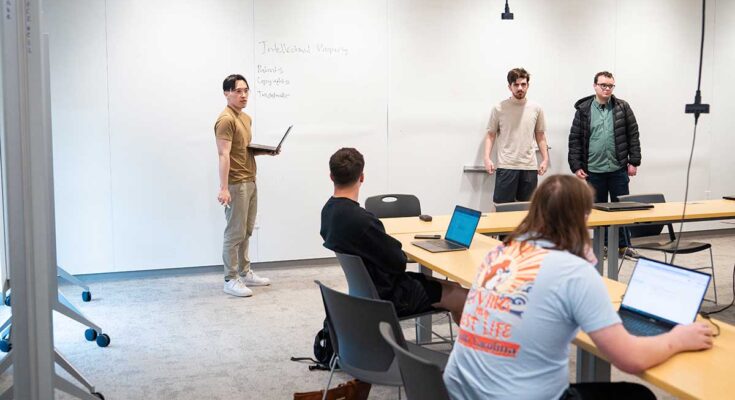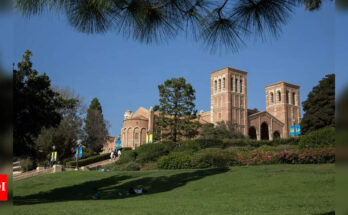Computers and Society course exposes students to a rich tapestry of perspectives on the ethical implications of computing
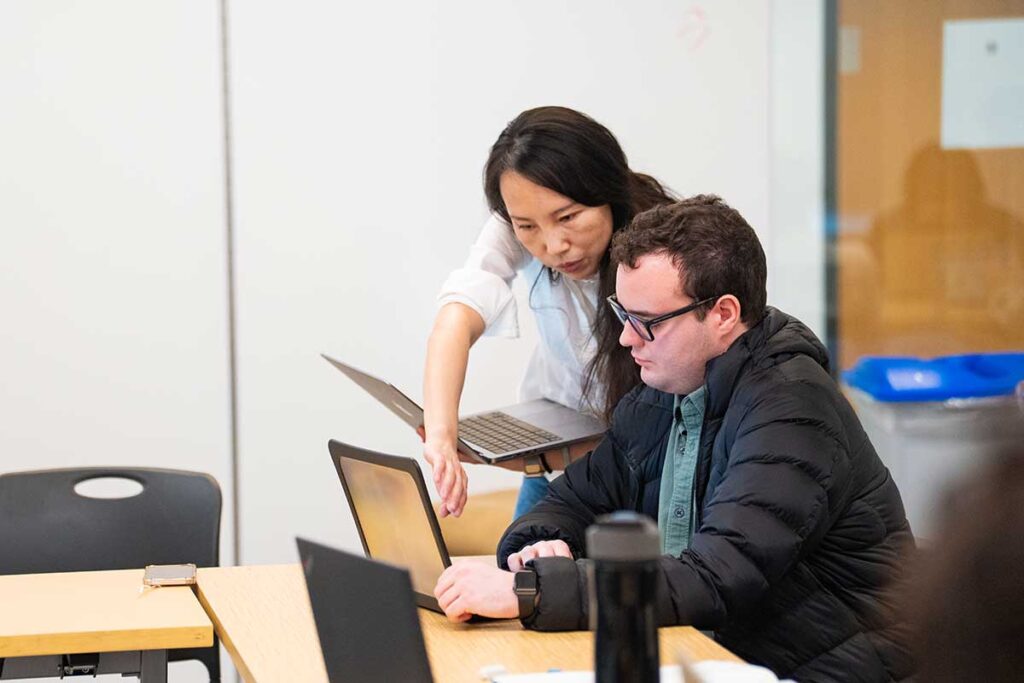
In the Computers and Society course, Jia Tao, associate professor of computer science (left), guides students as they explore the potential benefits, limitations, and dangers of technology. / Photos by JaQuan Alston
Inside the classroom is a new series offering a glimpse into classes at Lafayette, the talented professors who teach them, and how they impact and define a student’s experience.
By Stella Katsipoutis-Varkanis
Ask Prof. Jia Tao to sum up the essence of the Computers and Society course, and she’ll share this quote from Sara Baase’s book A Gift of Fire: Social, Legal, and Ethical Issues for Computing Technology: “In spite of the risks, in spite of these disasters, few of us would choose to return the gift of fire and live without it. We have learned, gradually, how to use it productively, how to use it safely, and how to respond more effectively to disasters, be they natural, accidental, or intentional.”
Like fire, Tao explains, technology comes along with its own set of potential benefits, limitations, and dangers. And in CS 200, students are challenged to explore its impacts—both positive and negative—on society and everyday life. “Technology is now unavoidable, and new problems and challenges keep coming with new advancements,” says Tao, associate professor of computer science, who taught one of the sections of the course this spring. “A lot of times there are no definitive solutions to those problems. This class aims to cultivate students’ critical thinking skills and give them profound insight into the implications of computing.”
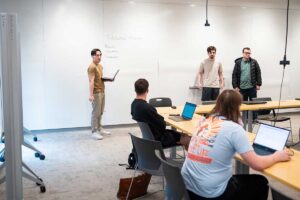
For their final project, CS 200 students made group presentations on topics of their choice, sharing insights they gained from class discussions and readings.
One of the longest-running computer science courses at Lafayette, CS 200 is a required course for computer science majors and data science minors that was originally offered only in the spring. But it’s gained so much traction from students across disciplines it’s now offered in both spring and fall semesters. “The majority of faculty members in the department have taught this course, so it’s truly a collaborative effort,” says Jorge Silveyra, assistant professor of computer science, who taught a section this spring as well.
Each week, students who took the class last semester delved into intensive reading exercises utilizing five different textbooks (including Baase’s quoted above), covering topics ranging from copyright and fair use, to algorithms and artificial intelligence. Using what they learned from their readings, students engaged in in-depth classroom discussions, group and individual projects, and writing assignments that called on them to consider each side of the often-controversial subject matter.
In their projects, students were challenged with tasks like reimagining social media platforms, writing privacy policies for tech companies, and creating YouTube videos. Silveyra’s students used the video platform to discuss their favorite music and how fair use and copyrighted material can be used in everyday life; Tao’s students, to share insights they gleaned from analyzing stories about surprising impacts of algorithms they may have never before considered. “The idea is to interact with the material in realistic ways, present our ideas and arguments in a professional manner, and understand each other’s points of view,” Silveyra says.
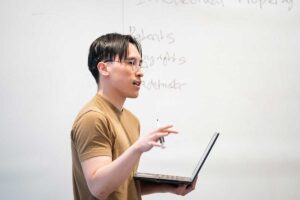
Nathan Dinh ’25 presents his final project on intellectual property to his CS 200 classmates at the end of the spring 2025 semester.
And with CS 200 drawing in students from virtually all class years and majors—including economics, psychology, government and law, engineering, English, history, philosophy, and others—students in the course are exposed to a rich tapestry of viewpoints from which they can learn. “Getting to hear different perspectives you might not have had, and synthesizing different backgrounds and multiple academic interests, greatly adds to the quality of the discussion when you’re trying to find ethical solutions to high-stakes debates,” says Nathan Dinh ’25, a computer science major who took Tao’s course in the spring. “I’ve grown so much just from talking to my classmates.”
The College’s hallmark small classroom sizes are also particularly conducive to the exchange of ideas and expression of opinions, allowing both students and professors to reach a depth of insight that wouldn’t be attainable with a larger group, Tao says. “At Lafayette, we want to create these environments that are safe and challenging,” Silveyra adds. “And the students themselves are willing to share, even when the topics could be difficult or controversial, because they come to this class with a growth mindset, ready to challenge their worldview.”
Computers and Society students have the added benefit of working alongside writing associates (WAs), who provide assistance to students for their assignments and help strengthen their writing skills. “WAs also help us as professors get a better understanding of what kinds of questions we should address in class,” Silveyra says. “It’s been a great partnership that has made a huge difference in the course.”
Tao and Silveyra make it a point to be available to support students outside of the classroom as well. “Prof. Silveyra is super accessible, and you can always knock on his door,” says Gia Mazza ’26, a computer science and math major who took Silveyra’s iteration of CS 200 this spring. “He’s always right there to chat with us.”
Dinh and Mazza add the skills and experiences they garnered from participating in the course will benefit them long after their time at Lafayette is over. Dinh, who has a wide variety of interests, says Computers and Society has made him more aware of the greater impact his work will have on society and helped him choose which areas he wants to work in. Mazza, who is planning to attend graduate school for either math or computer science, says, “This class allowed me to see the broader ethical implications of math, computing, and technology over time, and that’s important to me because I want to be someone who makes a positive change in the world.”
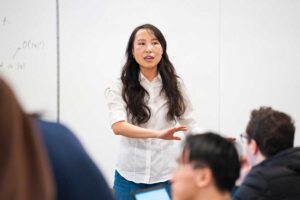
CS 200 is a learning experience for students and professors alike: Tao says teaching the course inspired her to pursue new research topics she’s never before considered.
The course proved to be eye-opening even for Tao and Silveyra, both of whom taught the course for the first time last semester. Tao, whose interdisciplinary research involves topics such as artificial intelligence, computer science, philosophy, logic, and game theory, says teaching the class broadened her perspective on the ethical challenges of AI, and exposed her to a wider range of questions she can pursue and study through her research. “Prof. Tao was very excited that she was learning a lot of new things as she was teaching us, and her enthusiasm spilled over into the class,” Dinh says.
Silveyra, whose research interests include computational epidemiology, building energy savings, and making computer science more welcoming and inclusive, says, “I’ve discussed ethical issues in computer science in classes I’ve taught before, but never in the way I did in this class—not with that level of passion and detail. It’s made me question things in a very different way, even in my own work. Even though my research doesn’t relate to this course explicitly, it’s being affected by it. And if two professors were impacted so largely by this, my expectation would be that everyone who takes this course would be impacted in the same way.”
